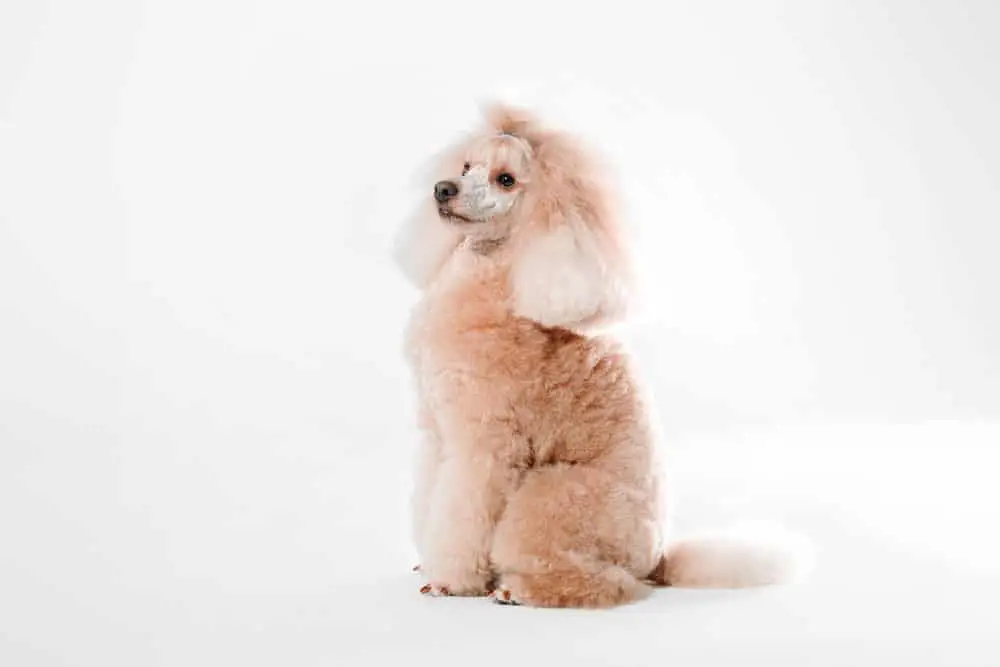All About Mini Shepadoodles: Facts, Temperament, and Care Tips
What is a Mini Shepadoodle?
The Mini Shepadoodle is a designer breed that combines the intelligence and loyalty of the German Shepherd with the hypoallergenic and low-shedding coats of the Poodle. Also known as Shepadoodles, these mixed breed dogs are popular for their playful and lively nature, making them a wonderful family pet.
Note: a Sheepadoodle is an English Sheepdog/Poodle mix…A Shepadoodle in this article refers to the German Shepard/Poodle mix.
The Mini Shepadoodle is a medium-sized dog, ranging from 18-22 inches tall and weighing between 35-55 pounds when fully grown. With their high energy levels, they require daily exercise and mental stimulation to keep them happy and healthy. They are highly intelligent breeds and excel in agility training and other mentally challenging activities.
It is important to note that like any mixed breed dog, Mini Shepadoodles may inherit certain health issues from their parent breeds, such as hip dysplasia or degenerative myelopathy. However, with proper care, these wonderful companions can live a healthy and happy life for 12-14 years.
History of the Breed
The Shepadoodle is a designer breed that has a fascinating history. This breed was developed by the United States Army in the 1960s with the purpose of creating an ideal service dog. The Army desired a canine with low-shedding coats and high intelligence.
In their quest for the perfect service dog, the Army crossed German Shepherds with Standard Poodles. This crossbreeding resulted in a mix that had the hypoallergenic and low-shedding traits of the Poodle, combined with the intelligence and working ability of the German Shepherd.
The Shepadoodle quickly proved to be successful as service dogs, as they excelled in various roles and tasks required by the military. Their intelligence and trainability made them valuable assets in the field.
After their larger cousins’ successful service with the Army, the Mini Shepadoodle started gaining popularity as wonderful family pets. Their loyal and friendly nature, combined with their low-shedding coats, made them an excellent choice for people with allergies and those looking for a low-maintenance dog.
Today, the Mini Shepadoodle continues to be cherished for its excellent watchdog abilities, high intelligence, and playful nature. Whether as a service dog or a beloved family pet, this breed offers the perfect blend of traits from its parent breeds—German Shepherds and Poodles.
Physical Characteristics
As mentioned before, the Mini Shepadoodle is a designer breed that is a cross between a German Shepherd and a Miniature Poodle. As a result, they exhibit a combination of physical traits from both parent breeds. They are medium-sized dogs, standing at around 18 to 22 inches tall at the shoulder and weighing between 30 and 50 pounds. Mini Shepadoodles have a sturdy and well-built frame, with a strong and muscular body. Their coat is typically low-shedding and can vary in texture, ranging from a wavy to a curly coat. The color of their coat can also vary, with combinations of black, brown, tan, or even white. This mix of coat colors and textures gives each Mini Shepadoodle a unique and charming appearance. They have expressive almond-shaped eyes and a well-defined snout. With their unique blend of physical features, Mini Shepadoodles are undeniably adorable and instantly recognizable as a designer breed.
Parent Breeds


The German Shepherd is a versatile and intelligent breed that was developed in Germany in the late 19th century. Originally bred as herding dogs, they have since become popular as police and military dogs due to their high intelligence, loyalty, and protective nature. German Shepherds are known for their versatility and excel in various activities such as obedience, agility, and search and rescue.
The Miniature Poodle, on the other hand, is a smaller and equally intelligent breed. They are known for their curly coats and low-shedding tendencies, making them a great choice for people with allergies. While Poodles were originally bred as water retrievers, they are now highly regarded as family pets due to their friendly nature, intelligence, and trainability.


When these two breeds are combined, the result is a Mini Shepadoodle that inherits the best traits from each parent. They are known for their intelligence, loyalty, and versatility, much like their German Shepherd ancestors. Mini Shepadoodles make excellent family pets and are well-suited for active families who can provide them with mental stimulation and daily exercise.
With their genetic makeup rooted in two highly regarded breeds, Mini Shepadoodles are wonderful family pets and can excel in various activities such as agility training and obedience. They are known for their loyal and loving nature, making them the perfect addition to any household.
Height and Weight Range of Mini Shepadoodles
Mini Shepadoodles are an adorable designer breed that combines the traits of the German Shepherd and the Miniature Poodle. These dogs are known for their intelligence, loyalty, and versatility, making them wonderful family pets. One commonly asked question about Mini Shepadoodles is regarding their size.
The size of Mini Shepadoodles can vary depending on the dominant parent breed. While they may not always be mini-sized, they are smaller in comparison to their full-grown Shepadoodle counterparts. On average, Mini Shepadoodles stand between 15 to 20 inches tall at the shoulder.
In terms of weight, Mini Shepadoodles typically range between 30 to 45 pounds. However, it’s worth noting that the variation in size can be influenced by the genetic makeup of each individual dog. Some Mini Shepadoodles may lean more towards the German Shepherd side and end up closer to the larger end of the size spectrum, while others may take after the Miniature Poodle and be on the smaller side.
Regardless of their size, Mini Shepadoodles are cherished for their loving nature, intelligence, and loyal personalities. Whether they are small or a bit larger, these wonderful mixed breed dogs adapt well to both small apartments and larger homes. With their versatile size and incredible temperament, Mini Shepadoodles make excellent companions for families of all sizes and lifestyles.
Coat Type and Colors
Mini Shepadoodles can have a variety of coat types and colors, adding to their unique and adorable appearance. The most common coat type for Mini Shepadoodles is medium-length and wavy, which gives them a soft and fluffy texture. However, it’s important to note that coat types can vary within individual dogs, with some having straight hair and others having curly hair.
When it comes to colors, Mini Shepadoodles can come in a range of options. They can have solid colors like black, tan, brown, white, or gray. Additionally, they can also have multi-colored coats with combinations of these base colors. Some Mini Shepadoodles have a red or apricot tint to their fur, while others may have cream-colored coats.
The varying coat types and colors of Mini Shepadoodles make each one unique and eye-catching. Whether they have wavy, straight, or curly hair, and whether their coats are solid or multi-colored, Mini Shepadoodles are sure to turn heads wherever they go.
Grooming Requirements
Grooming is an essential aspect of caring for Mini Shepadoodles. One of the main advantages of these adorable dogs is their low-shedding coats. This means that they are a great option for people with allergies or those who prefer a cleaner living environment. However, this doesn’t mean that Mini Shepadoodles don’t require any grooming.
Regular brushing is crucial to keep their coats looking healthy and prevent matting. The texture of their hair may vary depending on the parent breeds, with some having a straighter and smoother coat similar to their Poodle ancestors, while others may have a slightly coarser texture from their German Shepherd lineage. Regardless of the texture, a good brushing session a few times a week will help remove loose hair, prevent tangles, and keep their coat looking sleek.
In addition to brushing, some Shepadoodles may require haircuts to maintain their coat’s length and avoid overgrowth. This will depend on the specific characteristics of each individual dog. If you’re unsure about how to groom your Mini Shepadoodle, it’s best to consult with a professional groomer who can give you guidance based on your dog’s unique needs.
Overall, Mini Shepadoodles have relatively low grooming needs compared to other breeds. Regular brushing and occasional haircuts, if necessary, will ensure that your Mini Shepadoodle’s coat remains healthy and beautiful. With proper grooming and care, your Mini Shepadoodle will not only be a wonderful family pet but also a delight to have around.
Temperament & Training
Mini Shepadoodles are known for their wonderful temperament and intelligence, making them highly trainable and excellent family pets. These designer breed dogs inherit characteristics from their German Shepherd and Poodle parent breeds, creating a unique combination of traits. Mini Shepadoodles are typically energetic and require mental and physical stimulation to thrive.
They are highly intelligent and enjoy being challenged with training sessions and activities that keep their minds engaged. With their eagerness to please, Mini Shepadoodles are quick learners and respond well to positive reinforcement. Training should focus on establishing boundaries and positive behaviors, as well as socialization to ensure they are well-adjusted around people and other animals. With proper training, these delightful dogs can become loyal, obedient, and well-mannered companions.
Activity Level & Exercise Needs
Mini Shepadoodles are energetic dogs that love to be active, making them an excellent fit for active families. They need a healthy dose of physical activity, ideally around two hours of intense exercise and mind engagement every day to satisfy their activity needs.
Given their high energy levels, apartment life isn’t the best fit for Mini Shepadoodles. They need a good amount of space, like a large backyard or a dog park, where they can freely move around and expend their pent-up energy. Failure to get enough exercise can lead to boredom and potentially destruction.
Physical activity alone isn’t enough for these bright dogs. Mental stimulation is also vital to keep their minds sharp. Get creative with games, tasks, and puzzles to keep them engaged. This will not only keep them entertained but also ward off any signs of boredom or frustration.
Being social creatures, Mini Shepadoodles need regular interaction with other dogs and people. They love being part of the family activities, so regular walks, playdates, and training sessions with other dogs are highly beneficial for their overall happiness and well-being.
To sum up, Mini Shepadoodles are high-energy dogs that need a good deal of exercise and mental engagement. Ensuring that they get at least two hours of intense daily exercise, have access to ample outdoor space, and are engaged in mental and social activities will help them lead a satisfied and joyful life.
Intelligence & Mental Stimulation Needs
Mini Shepadoodles are renowned for their extraordinary intellect, which makes them highly amenable to training and responsive. This heightened intellect demands daily mental engagement to keep their minds keen and lively. Regular training sessions and tasks are pivotal for their overall health and vitality.
To cater to their mental engagement needs, Mini Shepadoodles enjoy a range of activities. Brain teaser toys, obedience training, and advanced commands can test their intellect and supply the mental workout they yearn for. Involving them in agility training or scent tracking can spark their problem-solving skills and amplify their overall cognitive abilities.
It’s important to understand that Mini Shepadoodles are vigilant and active canines. If left alone for extended periods of time devoid of mental engagement, they may become bored and resort to destructive behaviors. This could lead to the development of anxious tendencies or excessive barking or digging. To avert this, it’s vital to offer them daily mental challenges and interactive play sessions.
Wrapping up, Mini Shepadoodles are exceptionally smart canines that need daily mental engagement to keep them mentally and emotionally satisfied. Their vigilance and active disposition make them highly receptive to training and tasks. By involving them in regular training sessions and offering interactive toys, they can flourish in an environment that caters to their intellect and mental engagement needs.
Socialization & Good Behavior Training
Socialization and good behavior training are essential aspects of raising a well-rounded and well-behaved Mini Shepadoodle. Proper socialization from an early age is crucial to ensure that these dogs grow up to be friendly and comfortable around both people and animals.
By exposing Mini Shepadoodles to various environments, experiences, and individuals, we can help them develop confidence and adaptability. This socialization process helps prevent behavioral issues and accidents that can arise from fear or anxiety in unfamiliar situations.
Socializing Mini Shepadoodles with other dogs and different types of people, including children and strangers, encourages them to become friendly and sociable pets. It also helps them understand appropriate play behavior and teaches them how to interact politely with others.
In addition to socialization, good behavior training is a valuable companion to ensure that Mini Shepadoodles exhibit desirable manners. Training sessions that focus on obedience, commands, and positive reinforcement not only establish a strong bond between the owner and the dog but also teach them how to respond to cues and behave appropriately in various situations.
Ultimately, by investing time and effort into socialization and good behavior training, owners can ensure that their Mini Shepadoodles grow up to be well-behaved, friendly, and a joy to be around.
Health Considerations
If you’ve set your heart on adopting a Mini Shepadoodle, it’s vital to be cognizant of the potential health risks that could affect this designer breed. Mini Shepadoodles, a mix of German Shepherds and Standard Poodles, could be susceptible to certain health complications. Hip dysplasia is a prevalent issue; this is where the hip joint is misaligned, causing discomfort and hindrance in movement.
They could also suffer from degenerative myelopathy, an illness that progressively damages the spinal cord. It’s worth noting that these adorable mixed breed dogs could inherit health problems from either the German Shepherd or the Standard Poodle lineage, which could include genetic diseases or conditions.
To give your Mini Shepadoodle the best shot at a healthy life, it is recommended to source from a respected breeder who performs health tests and adheres to responsible breeding ethics. Regular trips to the vet, a nutritious diet, and daily physical activity are also fundamental for the overall health of your Mini Shepadoodle. With a sound understanding of possible health risks and proactive steps to counter them, you can contribute significantly to a long and wholesome life for your cherished Mini Shepadoodle companion.
Common Health Concerns in Mini Shepadoodles
Mini Shepadoodles are a designer breed that combines the genes of a Miniature Poodle and a German Shepherd. While they are generally healthy dogs, there are some common health concerns that potential owners should be aware of. One such concern is hip dysplasia, which is a hereditary condition that affects the hip joints. This can cause pain, lameness, and arthritis in Mini Shepadoodles, so regular health monitoring is essential.
Another health issue that can affect Mini Shepadoodles is epilepsy, a neurological disorder that can cause seizures. This condition can be managed with medication, but it is important to work closely with a veterinarian to find the right treatment plan.
Mini Shepadoodles are also susceptible to degenerative myelopathy. It is a progressive disease that affects the spinal cord, leading to weakness and difficulty in walking. While there is no cure for degenerative myelopathy, physical therapy and supportive care can help maintain a good quality of life for affected dogs.
Cancer is also a concern in Mini Shepadoodles, as it is in many dog breeds. Regular veterinary check-ups and early detection are key in managing and treating cancer.
Overall, it is important for Mini Shepadoodle owners to be aware of these common health concerns and to provide regular health monitoring and care. This includes regular veterinary check-ups, a nutritious diet, and providing plenty of exercise and mental stimulation for these intelligent and active dogs.
Conclusion
In conclusion, if you’re looking for a furry friend who will bring endless joy, love, and laughter into your life, look no further than the mini Shepadoodle. With their intelligence, loyalty, and affectionate nature, these adorable pups are the perfect addition to any family. So, why wait? Bring home a mini Shepadoodle today and experience the incredible bond that only a dog can provide. Your heart will thank you!


